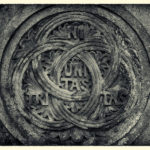We run our website the way we wished the whole internet worked: we provide high quality original content with no ads. We are funded solely by your direct support. Please consider supporting this project.

Responding to Von Balthasar on the Trinity and Suffering
Recently in his blog, The Dish, Andrew Sullivan pointed to an interesting article from The Other Journal called “Evil, the New Atheism, and the God of the Trinity,” written by Jacob H. Friesenhahn. One of the reasons I love Sullivan’s blog is that he dares to include meaty theological pieces like this right alongside of his often insightful and usually provocative political and social commentaries. Not only is the essay well worth reading, but be sure to watch the beautiful, intriguing, and haunting two-and-a-half minute video excerpt from The Tree of Life Sullivan couples with it. At any rate, I’d like to offer a review and response to this stimulating essay.
Friesenhahn argues that the best response to the problem of evil, at least as posed by the late Christopher Hitchens, is found in the doctrine of the Trinity. He offers several insights from the Trinitarian theology of Hans Urs von Balthasar, whose voluminous reflections on the Trinity and the nature of beauty have made him one the most respected theologians of the twentieth century. A central distinctive aspect of von Balthasar’s concept of the Trinity is that the love of the three divine Persons is kenotic (self-emptying) in nature. As Friesenhahn points out, this understanding of the Trinity renders intelligible the Incarnation, where God the Son divested himself of his divine prerogatives to become a full human being. Even more importantly—at least as it concerns the problem of evil—it renders intelligible the atonement, where the Son suffered the God-forsaken consequences of our sin on the cross.
How does this kenotic understanding of the Trinity answer the problem of evil? It does so, according to Friesenhahn, because the most important aspect of an adequate theodicy (the explanation for the problem of evil) is to “offer hope to those who are suffering.” This view of the Trinity does this by revealing that, out of love for lost humans, God poured himself out on the cross and made human suffering his own. The cross thus becomes the “gateway through which evil is annihilated and suffering and death are transformed.” While I’m quite sure Friesenhahn would not want to say that human suffering participates in Christ’s atoning work (though to me, he almost sounds like he’s saying just this), he does want to say that, by God’s grace, all suffering has a redemptive quality because it contributes to Christ’s suffering.
In response I’d like to briefly state one aspect of Friesenhahn’s account of von Balthasar that I love, and four areas that I found problematic.
First, I love von Balthasar’s kenotic understanding of the Trinity—at least insofar Friesenhahn has discussed it. I confess that, for some odd reason, I have never gotten around to reading any of von Balthasar’s work, despite the fact that numerous people have told me many of my ideas resonate with his. Reading this essay has inspired to finally look into him, at least the two volumes Friesenhahn based this essay on. In fact, I have to tell you that coming across this essay feels sort of providential, for only two days ago I finished a section in my forthcoming book, The Crucifixion of the Warrior God, in which I flesh out my view of God’s eternal, triune love as self-emptying, and my thoughts are almost completely in line with von Balthasar’s—at least as Friesenhahn recounts them. (The reason I say “almost completely” will become clear below).
Having said this, there are four problems I have with this essay. First, Friesenhahn pits von Balthasar’s response to the problem of evil against the “pat answers” given in the free will defense, in the claim that evil must balance good, and in the claim that suffering is part of God’s pedagogical strategy to teach and mature us. Hold on brother! I’ll concede that many versions of the free will defense are woefully inadequate. But I’d also argue—I have argued in Satan and the Problem of Evil—that the only way to consistently maintain that evil is not God’s will is to accept that evil originates in the free will of agents who are not God.
Second, and closely related to this, while I agree that an adequate theodicy must include offering hope to people who suffer, I don’t for a moment accept that we’ve arrived at an adequate theodicy simply by offering hope to sufferers. I affirm that God brings a purpose to all suffering, and I even accept von Balthasar’s view (as reported by Friesenhahn) that this purpose has a redemptive (though non-atoning) dimension to it. But offering hope to sufferers does nothing to explain why people suffer in the first place. This, in my view, is the primary objective of theodicy, and it’s why I maintain that appealing to the free will of humans and angels is anything but a “pat answer” that can be glibly dismissed.
Third, von Balthasar argues that Christ’s abandonment on the cross becomes intelligible only when we understand it in the context of a kenotic understanding of the Trinity. That is, we can only make sense of how God could experience God-forsakenness when we accept that God’s very nature is self-emptying. I totally agree. Indeed, this is the very point I make in The Crucifixion of the Warrior God, and I now plan on enlisting von Balthasar’s work in support of my view. But the explanation Friesenhahn provides as to how the kenotic Trinity renders Christ’s forsakenness on the cross intelligible is odd, at best. He says this abandonment reflects “the infinite distance among the divine persons eternally present within God’s inner nature.”
I frankly have no idea what Friesenhahn means by this. The “infinite distance among the divine persons”? I strongly suspect that the opaqueness of this statement is due to Friesenhahn’s recounting of von Balthasar’s view rather than with von Balthasar’s view itself. In any event, I’m instead arguing that a kenotic understanding of the Trinity renders Christ’s abandonment on the cross intelligible because the separation of the Father and Son on the cross was entered into out of perfect, self-emptying love – the very same love that unites the three Persons of the Trinity. So, as paradoxical as it sounds, the perfect union of the triune God is most perfectly expressed precisely when God experiences God-forsakenness. This is why how I am able to avoid the Charybdis of radical theologians like Moltmann who claim the unity of God was actually disrupted when Christ was forsaken, and the Scylla of various classical theologians who try to protect the unbroken unity of God by claiming Jesus only appeared to be forsaken. In my view, Christ was really forsaken, but because God’s unity is self-emptying love, this forsakenness was the quintessential expression of God’s loving unity, not its disruption.
Finally, Friesenhahn ends his essay by posing an important question. “How do we account” for “the millions of years of sentient life on this planet” that has “from the start been subject to pain, suffering, death, decay, predation, and parasitism…?” He acknowledges that he is “invoking both the prehistory of humanity and the crucial question of natural evil.” He contends that this question must be wrestled with “at the foot of the cross and within the framework of the Trinity” and that we “must address this daunting problem…in terms that are coherent and cogent for theology in a post-Darwinian context.”
This is the exactly right question to ask, but I am puzzled as to why Friesenhahn chose to close his essay by asking it, for so far as I can see, there’s nothing in the theodicy he offered that could even potentially address it! How could showing how Christ participates in and transforms human suffering have anything to say about animal suffering in the half billion years leading up to the human race, especially after you’ve already dismissed the free will defense as a “pat answer”?
For my two cents, the only explanation that is adequate is one that is rooted in the New Testament’s apocalyptic view of the cosmos as a corrupted battleground between God and all created agents who align with him, on the one hand, and Satan and all fallen agents who align with him, on the other. Hence, for example, the Gospels consistently assess sickness, disease, and deformities – all aspects of “natural evil” – to reflect the work of demonic forces. And, as I’ve argued elsewhere, this was the standard view of the church theologians prior to Augustine, who unfortunately, but influentially, announced that the ultimate explanation for all “natural evil,” as well as for all “moral evil,” was found in the mysterious and all-controlling will of God.[i] (I contend that this is when the “cosmic dictator” view of God that Christopher Hitchens always railed against was brought into Christianity.)
In closing, I agree that an adequate theodicy must offer hope to sufferers. But I also believe it must offer an explanation for how an all-good and all-powerful God could create a world that is as thoroughly screwed up and filled with nightmarish pain as the one we find ourselves in. If we agree that God does not will evil (in which case, how could he be all-good?), then it seems to me we must also agree that evil originates in the will of agents other than God.
That is no “pat answer.” When all is said and done, that is the only truly adequate answer.
[i] For my account of evolution as cosmic warfare, see “Evolution as Cosmic Conflict,” in Creation Made Free, ed. T. Oord. And for my account of the biblical and post-apostolic view of creation as corrupted by fallen angelic forces, see Satan and the Problem of Evil. Another excellent book on the role of fallen cosmic forces in “natural evil” and in evolution is S. Webb, The Dome of Eden.
Image by Dave77459. Used in accordance with Creative Commons. Sourced via Flickr.
Category: General
Tags: Apologetics, Problem of Evil, Trinity
Related Reading

Henry’s Mom: Did God Author This?
Many of you were touched last month when we featured some reflections on little Henry’s death. Well, Henry’s mother Jess has started a blog to process through some of her thoughts and we wanted to share this amazing piece with all of you. Jess thinks ahead to the time when her two-year-old daughter will start…

Is God Good?
Andrew Stawarz via Compfight This reflection by David D. Flowers seemed like a good addition to Greg’s recent blogs on free will. Here David talks about the problem of evil and how it is that we can call God “good” in light of a world full of evil. He even quotes Greg extensively. From the…

Podcast: What if Science Proved Jesus Did Not Rise From the Dead?
Greg responds to an accusation from Richard Dawkins and considers a hypothetical situation where scientists prove that Jesus did not rise from the dead. He also confesses which worldview he would adopt if he were to leave Christianity. http://traffic.libsyn.com/askgregboyd/Episode_0085.mp3

Why Trust the Bible?
A skeptic might point out that the proof regarding the authority of the Bible that we discussed in the previous post depends upon the Bible to prove its own inspiration. This might work for people who already believe the Bible is true, but what about people who don’t? Are there any arguments outside the Bible…

Podcast: Dear Greg: Does God Accommodate, or is God Simply Powerless?
Greg wrestles with a really tough tragedy and offers theological insight. http://traffic.libsyn.com/askgregboyd/Episode_0359.mp3

Knowing the Eternal God
If all our knowledge about God is to be oriented around the cross, as I argue in many places (see this post for instance), what does this mean for how we reflect on God’s transcendence? In other words, how can we speak of God’s eternal being since there obviously was no cross within God prior…
